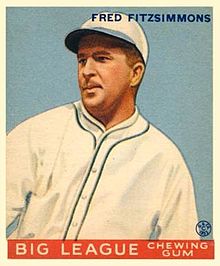Freddie Fitzsimmons
| Freddie Fitzsimmons | |||
|---|---|---|---|
 |
|||
| Pitcher | |||
|
Born: July 28, 1901 Mishawaka, Indiana |
|||
|
Died: November 18, 1979 (aged 78) Yucca Valley, California |
|||
|
|||
| MLB debut | |||
| August 12, 1925, for the New York Giants | |||
| Last MLB appearance | |||
| July 16, 1943, for the Brooklyn Dodgers | |||
| MLB statistics | |||
| Record | 217-146 | ||
| Earned run average | 3.51 | ||
| Strikeouts | 870 | ||
| Teams | |||
|
as Player
as Manager
|
|||
| Career highlights and awards | |||
|
|||
as Player
as Manager
Frederick Landis Fitzsimmons (July 28, 1901 – November 18, 1979), nicknamed "Fat Freddie", was an American right-handed pitcher, manager and coach in Major League Baseball who played from 1925 to 1943 with the New York Giants and Brooklyn Dodgers. Known for his mastery of the knuckle curve, his 217 wins were the third most by a National League right-hander in the period from 1920 to 1955, trailing only Burleigh Grimes and Paul Derringer. In 1940 he set an NL record, which stood until 1959, with a single-season winning percentage of .889 (16–2). He was an agile fielder in spite of his heavy build, holding the major league record for career double plays (79) from 1938 to 1964, and tying another record by leading the league in putouts four times; he ranked eighth in NL history in putouts (237) and ninth in fielding percentage (.977) when his career ended.
Born in Mishawaka, Indiana, Fitzsimmons broke in with the Giants in August 1925, posting a 6–3 record over the rest of the year. After seasons of 14 and 17 wins, he earned a career-high 20 victories in 1928, a year which saw the arrival of teammate Carl Hubbell; until Fitzsimmons' departure in 1937, the two would form a formidable left-right combination at the heart of the Giants' staff. In 1930 he led the NL in winning percentage for the first time with a 19–7 record (.731), and an 18–11 season followed in 1931. In 1933, the first full season after Bill Terry took over from John McGraw as manager, he won 16 games with a 2.90 earned run average as the Giants won the NL pennant; in the 1933 World Series against the Washington Senators, he suffered a 4–0 defeat in Game 3, though it was New York's only loss as they captured their first title since 1922.
...
Wikipedia
